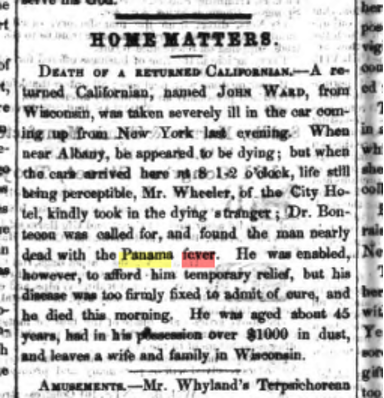Death of a Returned Californian
The record of interments in the city of Troy has yielded yet another window into the history of our country. On December 31, 1851, a “returned Californian” named John Ward died of “Panama Fever.” John Ward, born in England about 1808, had just migrated from England to New York in 1849 with his wife Charlotte and several children. His son William recorded that the journey took 22 days in a “Yankee ship with a Yankee crew.” (ancestry.com family tree) The family traveled on to Waukesha, Wisconsin, where the 1850 US Census listed them: John, 43, a farmer; wife Charlotte, 44; John Jr., 25; William, 16; and Hannah, 13.
John, Sr. and John, Jr. evidently got caught up in the excitement of the California Gold Rush of 1849. They may have travelled there overland- as the ancestry.com tree states John, Jr. died in Wyoming in 1850, perhaps en route. But John, Sr. definitely struck it in rich in California and travelled home via the Isthmus of Panama. He would have sailed from San Francisco to Panama, ridden a mule 25 miles east to the Chagres River, then gone by boat 75 miles downriver to the Atlantic Coast of Panama, where he would have had to wait for a ship sailing to New York.
That passage across Panama has always been dangerous. Though the Isthmus is narrow, its topography was dense jungle. After 1855 there was a railroad, which made it simpler, and then the Panama Canal was finished in 1914. Even today, the Darien Gap, the north-south gap in the Pan-American Highway at the Isthmus of Panama makes travel through the jungle deadly for thousands of immigrants making their way north.
So many traveling gold miners got ill and died that the New England Journal of Medicine in December 1851 ran an article about “Panama or Isthmus Fever”. “This disease, so much dreaded by Californians is…[like] many of our malarial fevers…” The author concluded that the rich vegetation of the land is turned by a thick black vegetable mold by the heat and rain and “the sunshine distills the poison.” The sufferer would first have a chill, he says “he is burning up and dying of thirst, his back hurts, and he feels as if he was smothering.”
By the time John Ward reached New York City, he was in the throes of Panama Fever. As the article accompanying this post states, he “appeared to be dying” when he reached Troy by train. He was taken in by the proprietor of the City Hotel and treated by Dr. Reed B. Bontecou, a young physician. Ward died the next morning, in possession of $1000 in dust- that is gold dust. At least he was able to tell Bontecou his name and all about his family. The doctor was the executor of his estate, as Ward died without a will, so presumably the family at least got the gold dust.
Ward’s sad story reminds us of the rigors of 19th century travel, the pull of the discovery of gold in California, and the primitive state of medicine. It is comforting that Troy tended the dying man, leaving his small fortune intact.



